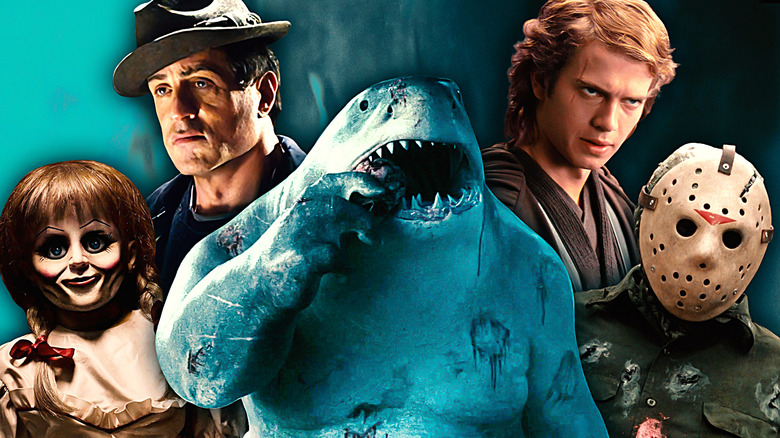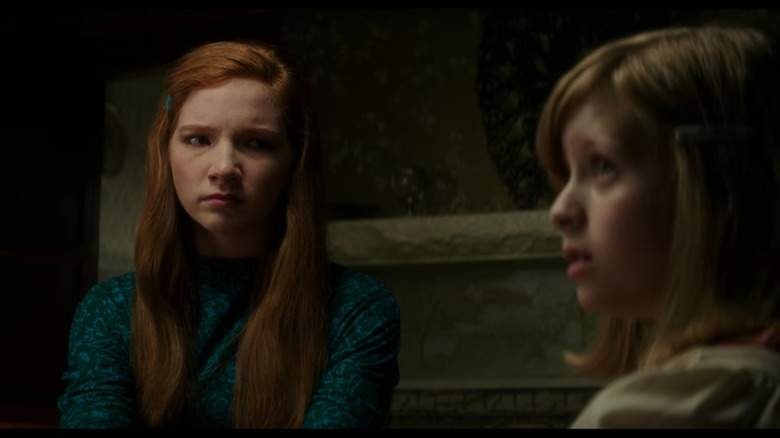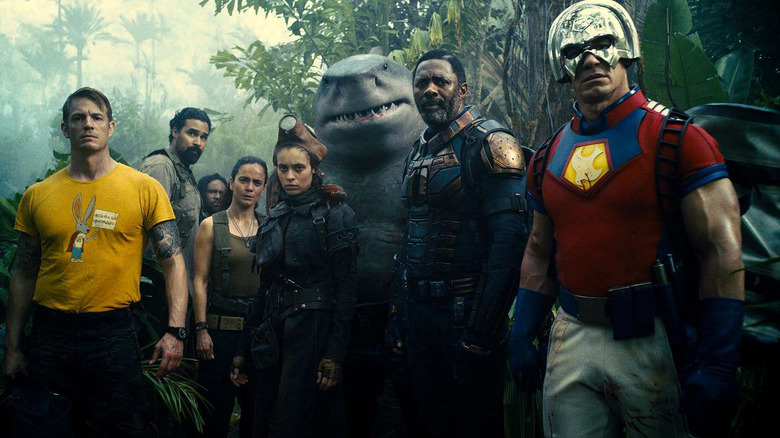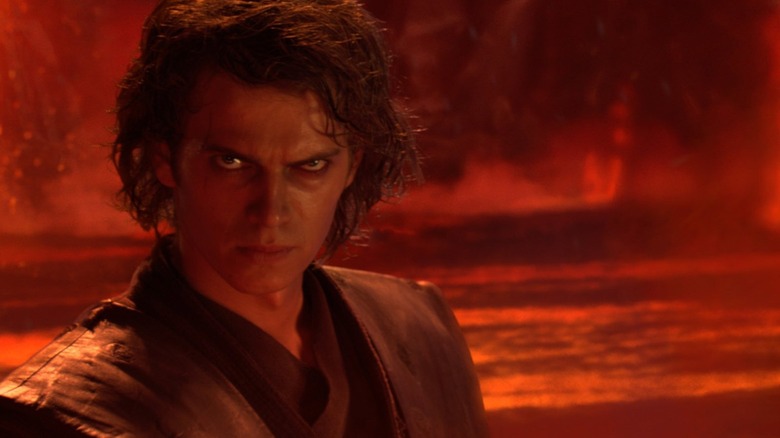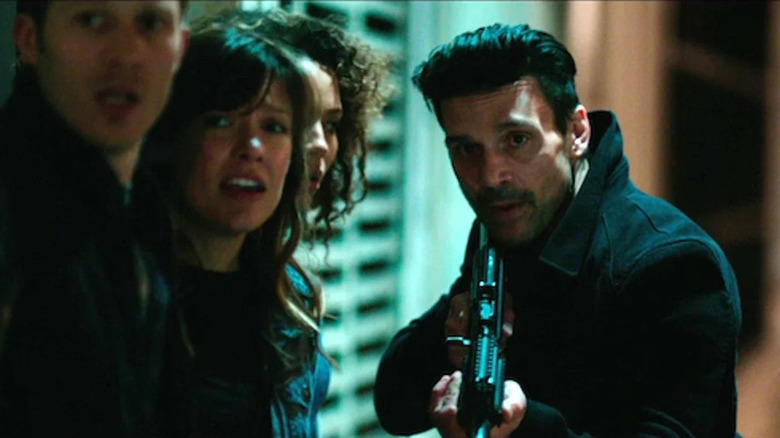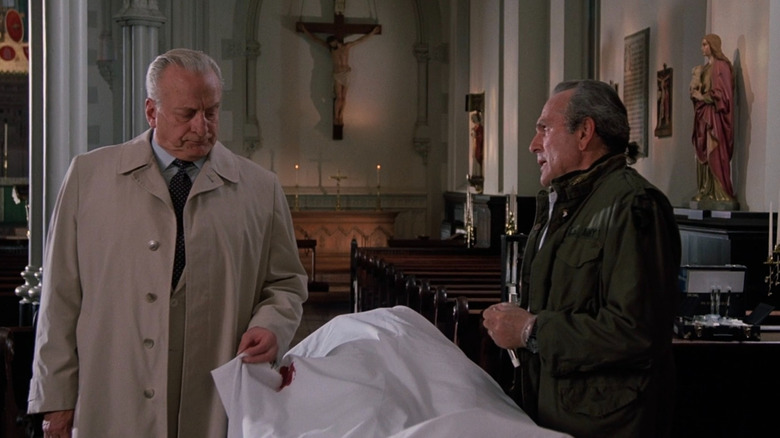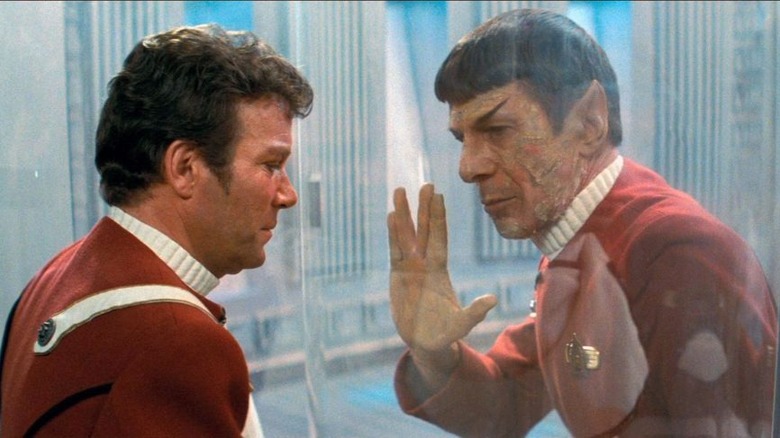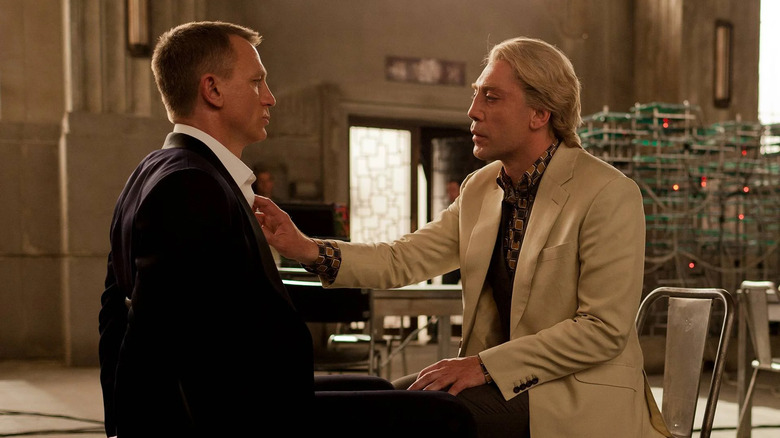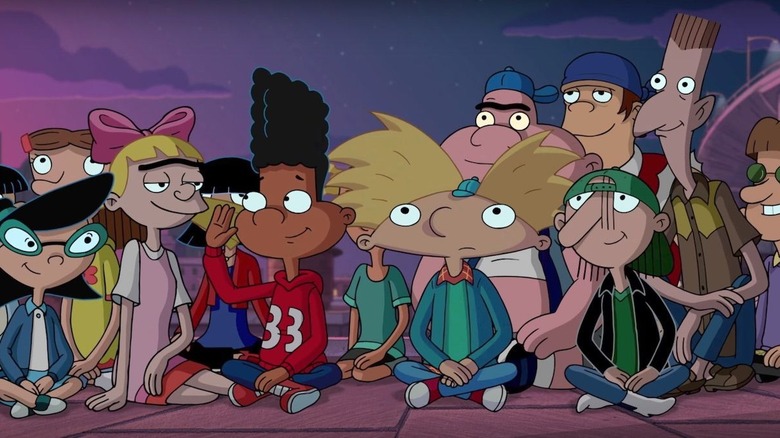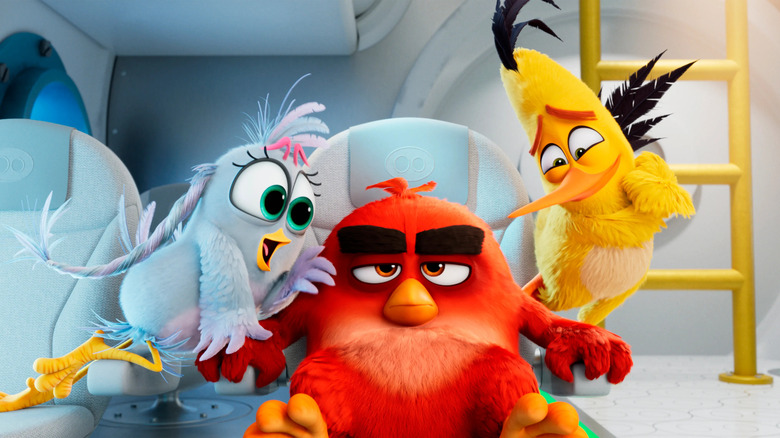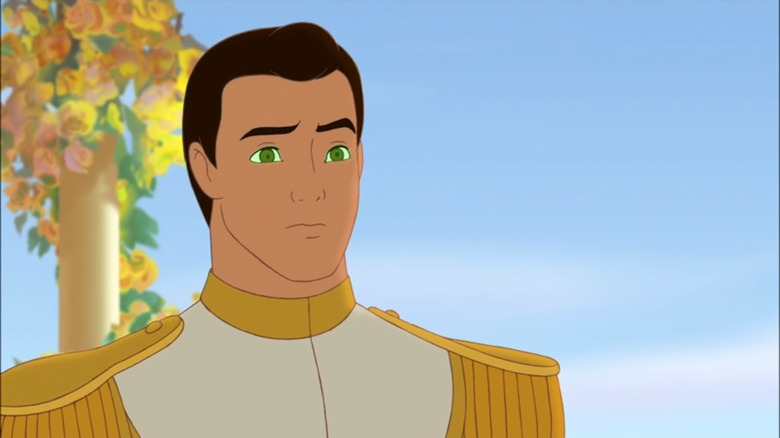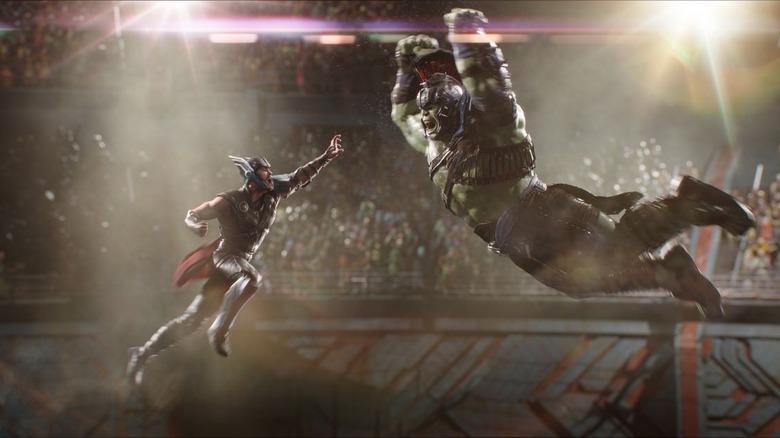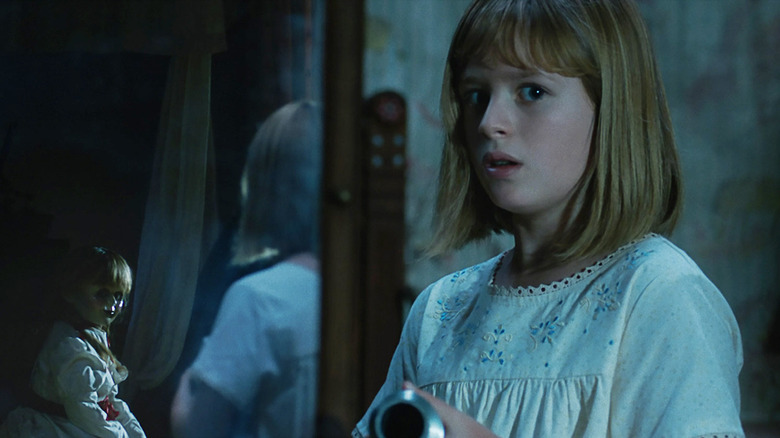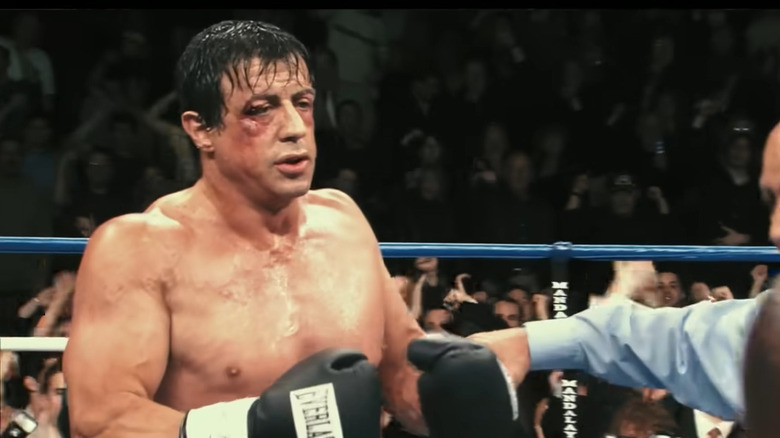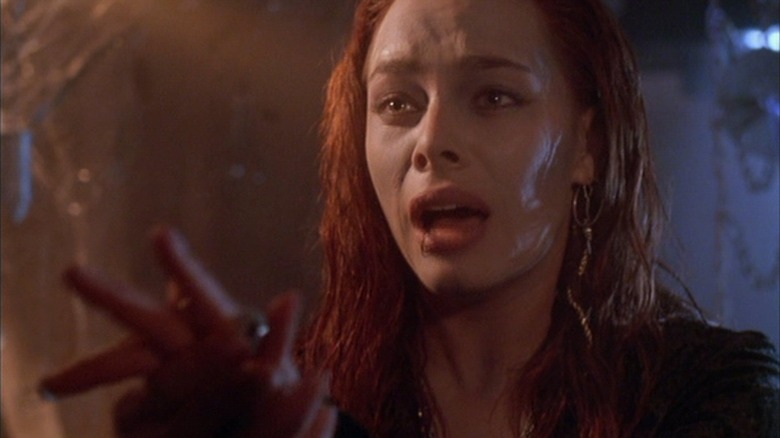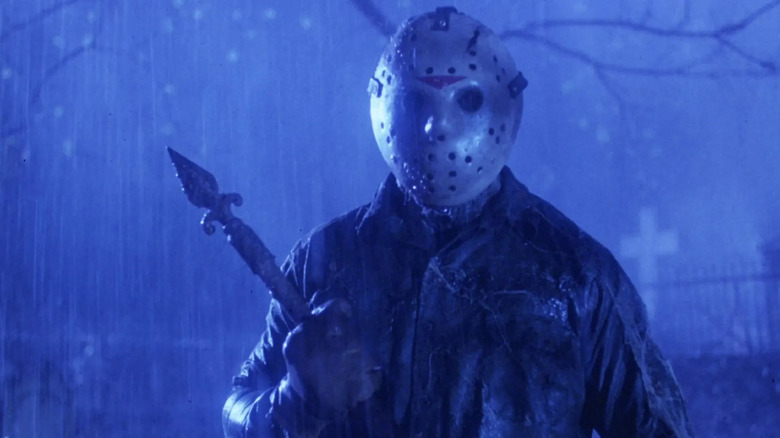The 15 Best Sequels To Bad Movies
It's a common refrain that the sequel is never as good as the original, with some movie sequels that truly didn't need to happen tainting the first film's legacy. Every so often, a sequel like "The Dark Knight" or "Terminator 2: Judgment Day" comes along that's just as good, if not better, than the first. These are the follow-ups that build upon a solid foundation to keep the characters' journeys going. But what happens when that foundation is filled with cracks and holes?
A bad movie doesn't bode well for a series' future. Whether the first movie got off to a rocky start or a franchise is already a few films deep and starting to lose its luster, it can be easy to write the whole thing off. But there are those rare cases where a sequel to an awful movie turns out to be pretty good, if not downright fantastic. These are the best sequels (and prequels) ever to come from bad movies.
Ouija: Origin of Evil
2014's "Ouija" is the coughing baby to the hydrogen bomb that is its prequel — "Ouija" Origin of Evil." It's safe to say no one had high hopes for a horror movie based on the spooky board game, and critics agreed, giving the first film an abysmal 6% score on Rotten Tomatoes. With a rote plot and over-reliance on cheap scares, most people would be better off playing Monopoly than watching this. Still, it made over $100 million at the global box office, meaning a follow-up would soon be upon us.
But in perhaps one of the greatest upgrades in cinematic history, Mike Flanagan of "The Haunting of Hill House" and "Midnight Mass" was brought on to write and direct. The results speak for themselves, with the horror flick garnering an impressive 83% from critics on Rotten Tomatoes. It's a more robust feat both visually and in terms of storytelling, as we learn more about the family only hinted at in the first. Flanagan may have hated the "Origin of Evil" title, but there was plenty for audiences to love in the movie that had no right to go this hard.
The Suicide Squad
"The Suicide Squad" sometimes feels more like a straight-up remake than sequel, but given the return of characters like Margot Robbie's Harley Quinn and Viola Davis' Amanda Waller, it's very much within the same continuity. And director James Gunn fundamentally understands what makes this team-up work.
2016's "Suicide Squad" feels more interested in needle drops than telling a compelling narrative. Enchantress (Cara Delevingne) represents a world-ending threat, someone who probably could've been dealt with by proper superheroes rather than a woman in clown makeup wielding a baseball bat.
"The Suicide Squad" is far more brutal, utilizing an R-rating rather than a far tamer PG-13. The idea that anyone on this team could die feels more palpable, and Waller is a more nefarious character, sending the team to Corto Maltese to eliminate Starro before the local government can acquire it. It's a plot that's more in line with the black ops nature of the squad in the comics, where the government uses them because they genuinely don't want any heroes knowing what they're doing. Gunn just knows how to make a proper comic book movie, boding well for his future as the co-CEO of DC Studios.
Star Wars: Revenge of the Sith
The "Star Wars" prequel trilogy is rough, so it really needed to stick the landing where audiences finally see Anakin Skywalker (Hayden Christensen) descend into villainy to become Darth Vader. "Star Wars: Revenge of the Sith" could've been far less focused, as earlier versions honed in on more characters. Luckily, Anakin gets the spotlight, as everything falls into place for the Empire to take over.
It's a vast improvement over "Star Wars: Attack of the Clones," with its stilted dialogue (the less said about the "sand" line, the better) and lack of chemistry between Anakin and Padmé Amidala (Natalie Portman). If "Attack of the Clones" is supposed to be an epic romance, "Revenge of the Sith" is an Shakespearean tragedy, where the audience knows what has to happen.
While certain prequel issues are present in "Revenge of the Sith," like some clunky dialogue, the good parts more than make up for the bad. From Palpatine (Ian McDiarmid) chillingly declaring himself Emperor to Obi-Wan (Ewan McGregor) and Anakin's epic duel on Mustafar, the film almost redeems the entire prequel trilogy.
The Purge: Anarchy
"The Purge" has such an interesting premise — a dystopian United States makes all crime legal for a 12-hour period. Sadly, the first "Purge" movie squanders this premise with a lackluster home invasion story that doesn't make good on its political commentary. With a $3 million budget, it's understandable the first movie couldn't go all out, but luckily, it did well enough to where the sequel, "The Purge: Anarchy," could go all-in with a more rugged $9 million budget.
"Anarchy" takes the series out of the house and onto the streets, as viewers actually get to witness the chaos that occurs during this Purge. In filmmaking, there's the adage of "show, don't tell." The first "Purge" tells us about the political atmosphere that resulted in the government instituting a Purge. "Anarchy" shows how the wealthy use death squads to slaughter people in lower socioeconomic classes. There's also clearer commentary on how the government will use propaganda to convince people not to act in their best self-interest. It's a message that resonates now more than ever, with "Anarchy" still being the best of the "Purge" franchise.
The Exorcist III
"The Exorcist" is widely considered one of the best horror movies of all time, while "Exorcist II: The Heretic" is also a film that exists. Regan (Linda Blair) just isn't as engaging of a character in the sequel, and there's a significant lack of tension or building upon what came before. There would be a 15-year break between "The Heretic" and "The Exorcist III," but the three-quel is a solid return to form.
"The Exorcist III" picks up with Lieutenant William F. Kinderman from the first movie (now played by George C. Scott, taking over from the late Lee J. Cobb). Kinderman investigates a murderer seemingly copying the modus operandi of the deceased Gemini Killer, but as he dives further into the case, he wonders if the Gemini Killer could still be alive via supernatural means.
It's a fascinating new take on the "Exorcist" mythos, producing a new direction to tackle the idea that evil is an unknowable concept, with Scott playing the world-weary detective amazingly. Few works of art could ever reach the heights of the original "Exorcist," but "The Exorcist III" is a commendable effort and a good showcase for how to take horror franchises in new, intriguing directions.
Star Trek II: The Wrath of Khan
Sorry, Trekkies. "Star Trek: The Original Motion Picture" is a bit of a slog to get through. It's not outright terrible, but it often appears to forget what made the "Star Trek" TV show so iconic in the first place. People tuned in to see these characters and how they grew through each adventure, and that idea is sorely missing in the first cinematic outing.
"Star Trek II: The Wrath of Khan" makes up for this and then some. It's not just the best "Star Trek" movie to date but one of the best sci-fi flicks period, with an emotional core and incredible villain in the form of the titular Khan (Ricardo Montalbán). And Spock's death, while it would eventually be undone, is impossible to watch without tearing up a little bit, especially if you grew up watching him as the persistent voice of reason on the USS Enterprise.
"Wrath of Khan" brings emotion back to the franchise, which is something director Nicholas Meyer understood all too well when speaking with IndieWire. "Whether it's the Kirk-Spock friendship or Kirk's relations with his son or the oddly sympathetic villain, the abandoned Khan," Meyer stated. "It's sort of the bits and pieces that mix together and create those sparks of feeling."
Skyfall
James Bond producers don't regret "Quantum of Solace," but many audiences who had to sit through it might. After the stellar "Casino Royale," "Quantum of Solace" provides a far too angsty Bond (Daniel Craig) and a plot that's too boring compared to its predecessor. This could be attributed to the 2007-2008 writers' strike, with some sources saying the film began production without a completed script, which would certainly cause issues.
Fortunately, things got back on track with "Skyfall." It's an amazing return to form, with one of the franchise's best villains in the form of Raoul Silva (Javier Bardem). Honestly, "Skyfall" really feels like it's a celebration of everything that makes James Bond such an enticing character over the course of decades, allowing him to return to his roots.
That's nothing to say over the impeccable cinematography from Roger Deakins and an instantly iconic title song from Adele. "Skyfall" feels like what a 21st-century James Bond movie should be, helping make the character continue to feel essential after 50 years.
Hey Arnold! The Jungle Movie
If you take off your rose-colored nostalgia glasses, you might find that "Hey Arnold!: The Movie" just isn't that good. A storyline about a corporate takeover threatening Arnold's city, forcing Arnold and Gerald to engage in corporate sabotage, feels out of place. Enjoying the TV show and then finding comfort in a slightly longer adventure is totally understandable, but "Hey Arnold! The Jungle Movie" is far superior and a more fitting big-scale adventure for Arnold and his friends.
Throughout the show, the question of where Arnold's parents were always lingered. The series actually left off on Arnold discovering a journal saying how they went to South America, and the movie sees Arnold follow them to the country they were last seen. It's a more personal storyline for Arnold than a routine "Let's save the city" plot, and the movie provides a fitting swan song for the character, as he does eventually find them and bring them back home. Whereas "Hey Arnold!: The Movie" feels like unnecessary DLC for the show, "The Jungle Movie" rounds out everyone's character arcs nicely so that all of the fans can enjoy some much-needed closure.
The Angry Birds Movie 2
At the time it came out in 2019, "The Angry Birds Movie 2" was the highest-rated video game movie on Rotten Tomatoes. It would eventually get surpassed by the awesome "Werewolves Within," but it's a testament to how the sequel is far better than it needed to be.
The first "Angry Birds Movie" is pretty much what one would expect. It takes iconography from the mobile game and throws in a generic family-friendly plot and bright animation to get audiences in seats. "The Angry Birds Movie 2" deviates more from what fans know from gameplay and goes all in on absurdist humor and joke-a-minute writing.
This isn't to say the sequel is the peak of cinema, but adults unfamiliar with the games may find it actually funny and watchable at times. Sometimes, that's all you need out of a video game movie. Plus, Leslie Jones does impeccable voice acting work as the villainous Zeta.
Cinderella III: A Twist in Time
It's astonishing how similar the trajectories are for "The Exorcist" and "Cinderella" franchises. The first is an all-time classic, the second probably shouldn't exist, and the third is a substantial improvement that takes the series in an interesting direction.
"Cinderella II: Dreams Come True" from 2002 is a disjointed mess, consisting of various vignettes lacking any strong central focus. "Cinderella III: A Twist in Time" is fairly interesting, with a plot involving Lady Tremaine casting a time-reversal spell to prevent the Prince from falling in love with Cinderella in the first place. It expands upon what fans know from the original movie, making the Prince a more developed character and expanding upon Lady Tremaine and Cinderella's step-sisters so that they feel grander than mere one-dimensional antagonists.
"Cinderella III" is a wild swing, and it's one that mostly works, especially considering it's a straight-to-video Disney sequel, which don't have the best of reputations. When in doubt, bring time travel into the mix.
Thor: Ragnarok
For the longest time, Thor (Chris Hemsworth) was the dark sheep of the Marvel Cinematic Universe. Movies like "Iron Man" and "Captain America: The Winter Soldier" got far better receptions than Thor's two solo movies, with "Thor: The Dark World" frequently ranking among the worst MCU films. Thor always seemed to fall short outside of the "Avengers" films. Finally, with "Thor: Ragnarok," the god of thunder got his movie that could officially be classified as "great."
A big part of that comes down to the humor. "Thor: Ragnarok" is easily one of the funniest MCU flicks, with Thor dropping his Shakespearean manner of speaking for something more casual to drop all those one-liners. While the movie's humorous, it also deserves points for testing Thor like never before and being much darker than some people probably remember. His sister, Hela (Cate Blanchett), is a great foil, and Thor loses pretty much everything in this movie, from his eye to his father to his home of Asgard. Plus, Thor riding a lightning bolt set while Led Zeppelin plays is always a welcome treat.
Annabelle: Creation
As a spinoff from "The Conjuring" franchise, 2014's "Annabelle" is about as good as one would expect, which is to say not very. "The Conjuring" was known for its chilling atmosphere, but "Annabelle," with its myriad jump scares, feels like generic horror fare trying to capitalize on an established brand. Fortunately, "Annabelle: Creation" goes down the "Ouija" route of serving up a far more compelling prequel to the evil doll.
Helmed by "Lights Out" director David F. Sandberg, "Annabelle: Creation" brings back a chilling atmosphere, opting for a more Gothic tone and setting. While child actors tend to get a bad rap, Lulu Wilson and Talitha Bateman offer compelling performances as two orphans tormented by a demon. The scares feel more well-earned, and overall, "Annabelle: Creation" feels like it can actually stand on its own rather than merely existing as corporate branding to get people to show up to future "Conjuring" movies.
As a prequel's prequel, "Creation" could easily have fallen under the weight of other movies in the franchise. But Annabelle has become a horror icon for a good reason, and "Creation" makes good use of the creepy doll.
Rocky Balboa
It's no wonder the "Rocky" franchise went dormant after 1990's "Rocky V." Lackluster villains and some convenient plot devices, such as Rocky losing all his money so that the story could happen in the first place, indicate the series is running on fumes at this point. It would take until 2006 with "Rocky Balboa" for Sylvester Stallone's legendary character to return, and he came back in a big way.
The film sees the aging Rocky Balboa challenged to an exhibition match from a hothead young fighter (a particularly prescient plot considering the Jake Paul vs. Mike Tyson fight in 2024). Outside of the fights, the film offers a somber reflection of Rocky's character, like him coping with irrelevance in the world of boxing and dealing with the grief of losing his wife, Adrian (Talia Shire).
If nothing else, the world owes a debt of thanks toward "Rocky Balboa" for setting the stage for the superb spinoff, "Creed," and its sequels. As both Rocky Balboa and Stallone have had to learn, sometimes you just need to know when to pass the torch.
Return of the Living Dead 3
"Return of the Living Dead" is a great, campy addition to the zombie genre, whereas "Return of the Living Dead Part II" is ... pretty much the exact same. The meta nature of the first flick is copied and pasted over to the sequel to fairly abysmal results. Something that felt punk rock was now trite, but "Return of the Living Dead 3" became a marked improvement by offering a zombie love story the world so desperately needed.
The military has continued experimenting on bringing people back from the dead with the unfortunate side effect they're now brain-hungry zombies. Young Curt Reynolds (J. Trevor Edmond) uses the technology to bring back his deceased girlfriend, Julie Walker (Melinda Clarke). The fact it's doing something wholly different than its predecessor is cause for celebration enough with its angsty love story. If "Return of the Living Dead" was punk rock, the threeq-uel gets into the grunge era to correspond with coming out in 1993. We'll always appreciate an odd sequel that takes a wild swing over just repeating what's worked before.
Friday the 13th Part VI: Jason Lives
If "Friday the 13th: A New Beginning" is the low point of the franchise, where it's just spinning its wheels and doing the same old thing repeatedly, "Friday the 13th Part VI: Jason Lives" represents the zenith. There are only so many ways a masked killer can terrorize camp counselors before it starts feeling stale. "Jason Lives" has plenty of that but with a new tongue-in-cheek tone.
A decade before "Scream" won praise for its meta nature, "Jason Lives" made "Friday the 13th" self-aware. There are a ton more gags and subtle winks to the audience that the franchise is in on the repetitive nature of these movies at this point. "Jason Lives" sets the stage for more ridiculous Jason adventures to come, like traveling to Manhattan or outer space.
Sometimes, long-running franchises need to mix things up. "Jason Lives" was the shot in the arm the series needed and remains arguably the best of the entire franchise up there with the very first installment.
